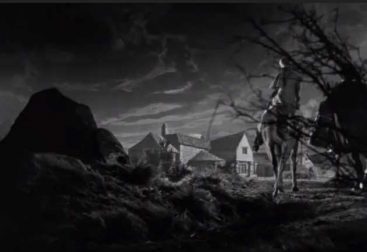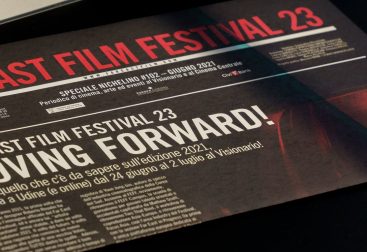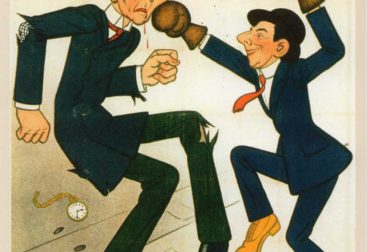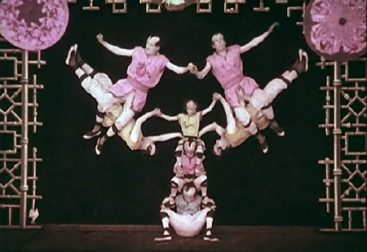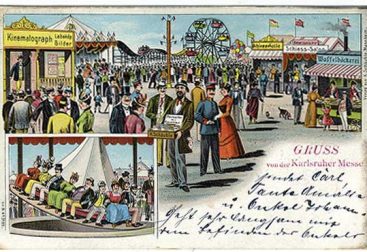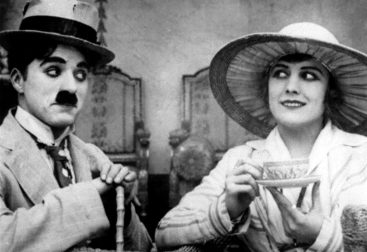… was for me in every conceivable way the event for the fortieth anniversary of the Karlsruhe Kinemathek, which, as I have explained elsewhere *, should better be called “Municipal Cinema”.
The event took place in September 2014 and I haven’t thought about it for a long time. Or rather: I had probably repressed what I had experienced, also because I had to do a lot of tasks in the student cultural center in the last two years before my retirement.
Gradually I should reveal to the reader what made this event so unique, because otherwise the reader might stop reading. There be God – the God of the cineasts and cinephiles!
Two films were on the program at the event: “Entr’acte” by René Clair and “Le sang d’un poète” (The blood of a poet) by Jean Cocteau. The first a silent film, the second an early sound film. Alfred Meyer or Inka Gürtler soon explained why these two films were shown to the honored audience, among whom were many of the “usual suspects”, ie people who had to show themselves or who would like to show themselves. The two films were on the program of the very first film screening of the then newly founded association of cineastes and cinephiles, which then became the municipal cinema of the city of Karlsruhe, which for several decades – probably because of the lack of imagination of the association members – simply called itself “Das Kino” .
Years before, the Karlsruhe Silent Film Festival had been able to show a print of the Cinémathèque Francaise after a great deal of effort and the festival paid a handsome sum for it. The Cinémathèque Française categorically refused to show a print other than its own. In addition, you should know that the Cinémathèque Française is legally the owner of the rights, but at that time informed René Clair’s son about every screening, who seemed to have a kind of veto right. One felt “morally obliged” to ask him if he would agree to a screening, said an employee of the Cinémathèque when there were significant differences afterwards about the screening of another René Clair film.
So it is impossible that the Cinémathèque Française had heard of this screening. Then the early talkies by Jean Cocteau followed. Also an unrestored 16mm copy from the collection of the Kinemathek Karlsruhe; in a similarly bad condition, which had a particularly fatal effect on the intelligibility of the sound. After all, there are treads not only in the visible image, but also on the audio track, which is not visible to the audience, if it is a light-tone copy. That is mostly the case. With regard to the legal situation, I am not as familiar with Jean Cocteau as with René Clair, so I cannot comment on this.
So the evening was really unforgettable for me as a cinematic low point. I can’t remember ever seeing such bad prints. Alfred Meyer and Inka Gürtler may be film buffs, but they are not cinephilous. Those who love the cinema don’t force their audience to endure such an evening. After the performance, I asked Inka Gürtler why they had shown these copies. You couldn’t help it, was the answer; their financial situation would not allow anything else.

In my memory, this evening, i.e. the fortieth anniversary, is mixed up in a somewhat strange way with the farewell to Alfred Meyer and Inka Gürtler from the services of the Kinemathek, which then took place three years later. Certain speeches were too similar, the staff in the hall as well as in front of the audience and the situation were too similar, so that I can no longer say at which of the two events, at the anniversary or at the farewell, Alfred Meyer made long explanations about his decades of work who were connected with accusatory references to what he considered to be the completely inadequate financial resources of the cinematheque? Maybe both. He was happy to emphasize how much pleasure it was to sit in the cinema with few or very few viewers and watch a film that apparently only he and the director of the Natural History Museum, who was often present on such occasions, appreciated. The latter was then given in a speech of praise on the same topic, i.e. the unique pleasure that a film showing in a medium-sized and almost empty hall can provide when only a few to very few visitors are present. In order to be able to indulge in this pleasure on a regular basis, considerable efforts have evidently been made. I am now getting into fiction, but so be it. The idea of reaching an audience with the film programs and perhaps measuring the success by whether and in what way it succeeded was evidently very, very alien to Alfred Meyer.
With Alfred Meyer and the director of the Natural History Museum, two despisers of the audience were among themselves, and their explanations provided a conclusive explanation for the difficult financial situation of the Kinemathek Karlsruhe. Anyone who philosophizes in all seriousness about how nice it is to be one of the very few viewers in the hall to be able to admire the actual or supposed quality of a rarely shown film – and is also proud of not having reached an audience, or – the climax of the Enjoyment: Having driven a few viewers out of the hall because they found the film boring, bad or unbearable has no moral right to complain about a lack of subsidies. Anyone who dares and does not make any effort to find an audience for the films of their choice will at some point really run out of money to show a good copy of a silent film with musical accompaniment.
And then we have another detail for the tear glands: The press release of the city of Karlsruhe from April 14, 2017 on the adoption (so no doubt which of the two events it was) quoted from a letter from an unnamed friend of Alfred Meyers and Inka Gürtler. Now please have the handkerchiefs ready and use them if necessary! This friend’s heart was obviously torn to see Alfred and Inka parting. That was, of course, an accusation in the direction of the cultural office, which should be told what it did with the (we do not want to say: forced) resignation of Meyer and Gürtler, which was apparently caused by pressure from the city: broken hearts, crying friends, traumatized film buffs – what is still missing? End of the use of the lacrimal glands.
The farewell to Meyer and Gürtler was apparently the end of a development that had slowly begun and of which only a few details really made it public. And I like to admit it, I haven’t followed and noticed everything. My work as managing director of the student cultural center did not allow me to observe everything up close. So let’s take another look at some of the details of the two events – they are enlightening enough.
It is perhaps understandable that after many years in which the cultural office repeatedly warned to improve marketing in order to reach a larger audience, the cultural office’s appreciation of the cinematheque gradually declined and the relationship with Alfred Meyer changed somewhat (that’s presumably understated). For the 40th anniversary, neither the cultural mayor nor the head of the cultural office, but only their deputy, the head of the city archive, appeared to deliver the dutiful eulogy of Alfred Meyer and Inka Gürtler. However, when the farewell was certain, none other than the Lord Mayor Frank Mentrup came to read the farewell speech for Alfred Meyer and Inka Gürtler and the new managing director Dr. Introducing Christine Reeh. The OB could come, because now Mr. Meyer was obviously rid of. As far as I can remember, the mayor was fortunate to be able to resist his brisk saying that he likes to make at the opening of the Independent Days. The slogan would then probably have read as follows: “A life without Alfred Meyer as director of the Kinemathek is possible but pointless.” The reader can certainly imagine how I would rephrase the slogan.

Dr. Christine Reeh then gave a speech that was probably dictated to her by the board of the Kinemathek, to which Alfred Meyer still belonged (!). You don’t want to show films (aha, thinks the surprised listener, but what then?), Well, you want to exhibit films, like in a museum. With all due respect, a pipe dream. Meanwhile, Dr. Christine Reeh past; just like Jens Geiger, who came with her; she has accepted a job at the Film University Potsdam, which is certainly better paid; he’s back to Hamburg.
Was it now at the anniversary celebration – I tend towards this version – or in the presence of the mayor at the farewell; In any case, in retrospect I have the impression that the present representative of the city’s cultural office should be made to understand with all clarity that Alfred Meyer (has) cheered the support he received for the Kinemathek in the way that suited him – and of course this support was enough never, because you could always have made more money. There were times when in certain circles a motto was known: “State dough – legal – illegal – don’t give a shit”.
As I said, three years later, after apparently great pressure from the cultural office, Alfred Meyer had to give up the post of managing director, and meanwhile (October 2020) he is no longer even on the board of the Kinemathek Karlsruhe e. V. That made Alfred Meyer so bitter that he said at a general meeting of the municipal cinemas in Berlin in February 2020 that he had “had to leave his own cinema” – and his partner Inka Gürtler with him.
I can understand why the poor boy is bitter now, but it was he himself who arranged the situation as it was when he said goodbye. And is the Karlsruhe Kinemathek his property, so that he speaks of his “own cinema”? One can safely say that with this attitude he headed the cinema for almost 40 years. Even so, this attitude was simply wrong. With his behavior towards partners, towards the cultural office and towards the public, Alfred Meyer has left traces that cannot be quickly erased. The successors have a hard time.
* The 813 film club should live, not just survive.
Title photo (at the top): René Clair, “Paris qui dort”
Press release from the city of Karlsruhe and city newspaper from April 14, 2017:
nka Gürtler also worked as a fellow campaigner and program curator for almost as long. The management team stepped down together at the end of January. Often one speaks of veterans, but in this case it actually applies, read Mayor Dr. Frank Mentrup received a note from a “friend” and cinema enthusiast at a party in Studio 3 last Friday. The duo “encyclopedic knowledge” about films and directors is impressive, they have mastered all the tricks. The farewell of the two is like the end of an old craft, “it tears your heart apart”.
Full of passion and love for film, Meyer and Gürtler made the Kinemathek what it is today: A renowned house that shows productions of all genres and styles, preferably in their original versions, often in the context of special series, accompanied by introductions and discussions with filmmakers.
The city treasures the cinematheque, emphasized Mentrup. So she was spared cuts in the most recent double budget, and her subsidy was even increased. Meyer said the funding was disproportionate to the work done and wanted a “fundamental rethink”. Cinemas like these are particularly valuable in these times, explained Gürtler, because 100 years of film history threatened to disappear with digitization. The new managing director of the Kinemathek is director and producer Christine Reeh, and Jens Geiger from the “Hamburg Film Festival” team will be responsible for the program in future. -maf-
An addendum:
A few days ago I spoke to one of the founding members of the Karlsruhe municipal cinema. This member was present at the 40th anniversary event of the cinema. It pointed out to me that there were other founding members in the hall at this event. Some of the founding members met again after a long time. The founding member with whom I spoke on the phone had very good memories that Alfred Meyer did not find it necessary to greet these founding members at the opening of the event. No, Alfred Meyer evidently did not consider such a perfectly appropriate gesture to be necessary. … (in December 2020)


